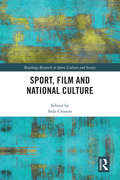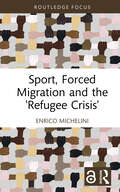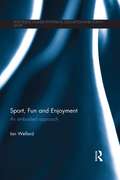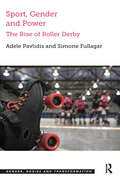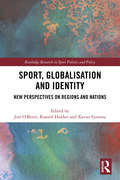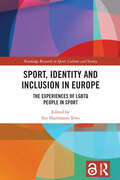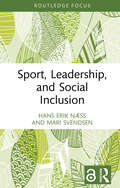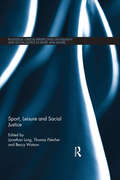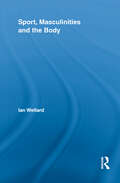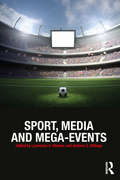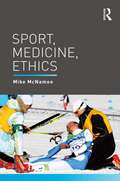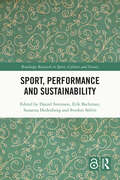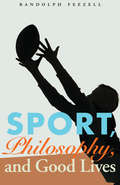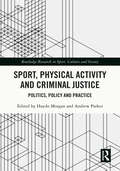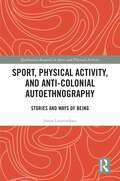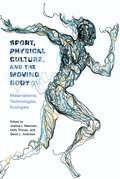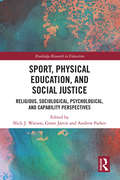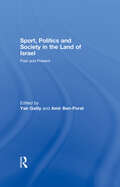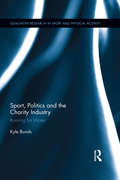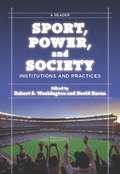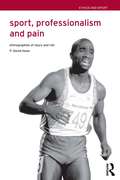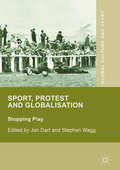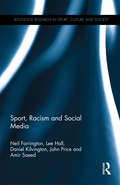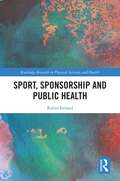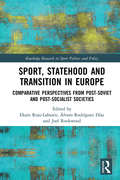- Table View
- List View
Sport, Film and National Culture (Routledge Research in Sport, Culture and Society)
by Seán CrossonSport and film have historically been key components of national cultures and societies. This is the first collection dedicated to examining the intersection of these popular cultural forces within specific national contexts. Covering films of all types, from Hollywood blockbusters to regional documentaries and newsreels, the book considers how filmic depictions of sport have configured and informed distinctive national cultures, societies and identities. Featuring case studies from 11 national contexts across 6 continents – including North and South America, Europe, Africa, Asia and Oceania – it reveals the common and contrasting approaches that have emerged within sport cinema in differing national contexts. This is fascinating and important reading for all students and researchers working in film, media, cultural studies or sport, and for broader enthusiasts of both sport and film.
Sport, Forced Migration and the 'Refugee Crisis' (Routledge Focus on Sport, Culture and Society)
by Enrico MicheliniDrawing on original research, this book looks at what sport can tell us about the social processes, patterns and outcomes of forced migration and the &‘refugee crisis&’. Adopting a systems theory framework and examining different sport disciplines, performance levels and settings, it represents a significant contribution to our understanding of one of the most urgent social issues facing the modern world. The book explores four key aspects of sport&’s intersection with forced migration. Firstly, it looks at how the media covers sport in relation to the &‘refugee crisis&’, specifically coverage of refugee elite athletes. Secondly, it examines the adaptation of sport organisations to the &‘refugee crisis&’, including the culture, programmes and structures that promote or obstruct sport for refugees. Thirdly, the book looks at sport in refugee sites, and how sport can be used as therapy, an escape or empowerment for refugees but also how it can reinforce the divisions between staff and the refugees themselves. Finally, the book looks at how forced migration influences and is influenced by participation in elite sport, by examining the biographies of elite migrant athletes. A richly descriptive, critical and illuminating piece of work, this book is fascinating reading for anybody with an interest in sport, migration, sociology or the relationship between sport and wider society.
Sport, Fun and Enjoyment: An Embodied Approach (Routledge Studies in Physical Education and Youth Sport)
by Ian WellardSport, Fun and Enjoyment explores the pleasurable aspects of sport within the context of everyday recreational and competitive physical activities. While much recent work has focused on the relationships between physical activity, health and wellbeing, much less attention has been paid to pleasure and fun, key aspects of our engagement with sport but not so easy to measure in terms of specific outcomes. By offering a critical exploration of what can be constituted as ‘fun’ in a sporting context, this book reveals the complex ways in which individuals approach sport and engage with it throughout the life course. The book considers the importance of pleasure and fun as a factor in our initial, formative experiences of sport activity, and as a factor in participation and continued participation. It explores the nature of fun as an embodied experience which incorporates a multitude of social, psychological and physiological components, and as a subjective experience which cannot be fully explained through simplistic binary formulations of pleasure and pain. Drawing on a wide research literature and original empirical research with children and adults, the book outlines a new theoretical framework for thinking about pleasure and fun in sport, highlighting the contrasting ways in which sport and physical activity is experienced and the interplay between individual and social contexts. Sport, Fun and Enjoyment is important reading for anybody with an interest in physical education, youth sport, the sociology of sport, physical activity and health, sport development or sport policy.
Sport, Gender and Power: The Rise of Roller Derby (Gender, Bodies and Transformation)
by Simone Fullagar Adele PavlidisAs a new breed of lifestyle sport enthusiasts ’derby grrrls’ are pushing the boundaries of gender as they negotiate the nexus of pleasure, pain and power relations. Offering a socio-cultural analysis of the rise and reinvention of roller derby as both a new, globalized women’s sport and an everyday creative leisure space, this book explores the manner in which roller derby has emerged as a gendered space for self-transformation, belonging and embodied contest, in which women are invited to experience their emotions differently, embrace pain and overcome limits. Sport, Gender and Power: The Rise of Roller Derby presents detailed interview, ethnographic and autoethnographic material, together with a range of media texts to shed new light on the complex relationships of power experienced by women in derby as a sport culture, whilst also examining the darker relationships that characterise the sport, including those of inclusion and exclusion, difference and identity, and competition and participation. A contemporary feminist study of empowerment, sexual difference, gender and affect, this book will appeal to scholars of gender and sexuality, embodiment, feminist thought and the sociology of sport and leisure.
Sport, Globalisation and Identity: New Perspectives on Regions and Nations (Routledge Research in Sport Politics and Policy)
by Jim O'Brien Russell Holden Xavier GinestaSport can be a vehicle for the expression of identity, and also a factor in the shaping of identity. This book explores the complex interrelationships between nations, regions and states in the landscape of contemporary international sport, with a particular focus on identity. Exploring important themes such as the geopolitics of sports events, contested identities, and ownership of sport and its impact on sporting cultures, the book presents contemporary and historical cases from around the world, including football in a divided Ireland; sport and the anti-Apartheid movement; Chinese sporting nationalism and soft power; and the role of sport media in the shaping of Catalan identity. This is an important resource for students and researchers working in Sports Studies, Sports Journalism, Sports Management Studies, Sports Marketing, Football Studies, Sport and Identity Studies, Sociology of Sport Studies, and Cultural Studies.
Sport, Identity and Inclusion in Europe: The Experiences of LGBTQ People in Sport (Routledge Research in Sport, Culture and Society)
by Ilse Hartmann-TewsThis book explores and critically assesses the challenges and experiences of LGBTQ people within sport in Europe. It presents cutting-edge research data and insights from across the continent, with a focus on sport policy, sport systems, and issues around anti-discrimination and inclusion. The book introduces the theoretical and methodological foundations of research into LGBTQ people in sport and then presents in-depth comparative surveys of systems and experiences in Austria, Belgium, France, Germany, Hungary, Italy, the UK, and Spain. A final section considers the effectiveness of policy in this area and motives for participation, and looks ahead at future directions in research, policy, and practice. Tracing the frontiers of our understanding of the experiences of LGBTQ people in contemporary Europe, this is fascinating reading for anybody with an interest in the sociology of sport, sport policy, LGBTQI studies, gender and sexuality studies, or cultural studies.
Sport, Leadership, and Social Inclusion (Routledge Focus on Sport, Culture and Society)
by Hans Erik Næss Mari SvendsenThis book considers how sport organizations can create inclusive practices to strengthen social progress, focusing on the importance of leadership in fostering positive change.Drawing on original research, and adopting a meso-level, multi-disciplinary approach that includes perspectives from sport management, the sociology of sport and organizational psychology, the book considers the evidence for sport as a vector of social progress. Featuring qualitative interviews with non-profit sport leaders from organizations across Europe, the book looks at the conditions under which social inclusion through sport is possible and examines the challenges and opportunities related to three areas of inclusivity and exclusivity: access, participation, and empowerment.Offering a new perspective on how leadership can help unlock the potential of sport as an inclusive force in society, this book is an important read for anybody with an interest in sport development, sport management, social inclusion, or the relationship between sport and wider society.
Sport, Leisure and Social Justice (Routledge Critical Perspectives on Equality and Social Justice in Sport and Leisure)
by Jonathan Long Beccy Watson Thomas FletcherSocial inequalities are often reproduced in sport and leisure contexts. However, sport and leisure can be sites of resistance as well as oppression; they can be repressive or promote positive social change. This challenging and important book brings together contemporary cases examining different dimensions of inequality in sport and leisure, ranging from race and ethnicity to gender, sexual orientation, disability, religion and class. Presenting research-based strategies in support of social justice, this book places the experiences of disadvantaged communities centre stage. It addresses issues affecting participation, inclusion and engagement in sport, while discussing the challenges faced by specific groups such as Muslim women and LGBT young people. Including original theoretical and methodological insights, it argues that the experiences of these marginalised groups can shed a light on the political struggles taking place over the significance of sport and leisure in society today. Sport, Leisure and Social Justice is fascinating reading for students and academics with an interest in sport and politics, sport and social problems, gender studies, race and ethnicity studies, or the sociology of sport.
Sport, Masculinities and the Body (Routledge Research in Sport, Culture and Society)
by Ian WellardThis groundbreaking work explores masculinity and the body within sports. Sports continue to retain expectations for presentations of specific forms of masculinity. The body is central to these presentations. These everyday bodily performances are rehearsed and performed either successfully or unsuccessfully - and the consequences of these actions play a significant part in the ability of the individual to continue to take part. Through participant observations, sporting life-history interviews (with over forty men) and research with children, this book examines the ways in which 'appropriate' sporting masculinities are learned and enacted to varying degrees of success. Wellard highlights the social processes which impact upon individual constructions and formulations of masculine identity and reviews these in relation to broader debates on gender, embodiment and sporting participation. This book contributes not only to the academic fields of sport and gender, but also to the efforts to confront continued forms of 'accepted' gender discrimination.
Sport, Media and Mega-Events
by Lawrence A. Wenner and Andrew C. BillingsBringing together many of the most influential scholars in sport and media studies, this book examines the diverse ways that media influences our understanding of the world’s most important sport events, dubbed sports mega-events. It sheds new light on how these events have been changed by the media, and have, in turn, adapted to media to further their brand’s cultural influence. Focusing on the central concept of "mediatization" – the permeation of media into all spheres of contemporary life – the book presents original case studies of major events including the Olympics, FIFA, rugby and cricket World Cups, Tour de France, Super Bowl, World Series, Monaco Grand Prix, Wimbledon, and many more. Written from a truly international perspective, this is a seminal work in sport and media studies that reveals the growing political, economic, and cultural influences of sport mega-events in contemporary society. Sport, Media and Mega-Events is an essential text for any course on the sociology of sport, event management, sport marketing, or featuring a cultural, communication or media studies approach to sport.
Sport, Medicine, Ethics
by Mike McNameeThe ethics of sports medicine is an important emerging area within biomedical ethics. The professionalization of medical support services in sport and continuing debates around issues such as performance-enhancing technologies or the health and welfare of athletes mean that all practitioners in sport, as well as researchers with an interest in sports ethics, need to develop a clear understanding of the ethical aspects of the sport–medicine nexus. This timely collection of articles explores the conceptual and practical issues that shape and define ethics in sports medicine. Examining central topics such as consent, confidentiality, pain, doping and genetic technology, this book establishes an important baseline for future academic and professional work in this area.
Sport, Performance and Sustainability (Routledge Research in Sport, Culture and Society)
by Sverker Sörlin Daniel Svensson Erik Backman Susanna HedenborgThis book examines the logic of ‘faster, higher, and stronger’ and the technoscientific revolution that has driven tremendous growth in the sports economy and in sport performance over the last 100 years. It asks whether this logic needs revisiting in the light of the climate crisis and sport’s environmental responsibilities. Drawing on multi-disciplinary work in sport history, sport pedagogy, sport philosophy, sport science, and environmental history, the book considers not only how sportification may have contributed to the growing environmental impact of sport but also whether it might be used as a tool of positive social change. It reflects on the ways that sport sets performance limits for other ethical reasons, such as doping controls, and asks whether sport could or should set limits for environmental reasons too. Sport, Performance and Sustainability touches on key themes in sport studies, including digitisation, activism, social media, empowerment, youth sport, and physical education. This is fascinating reading for anybody with an interest in sport, the environment, development, sociology, or culture. Daniel Svensson is an Associate Senior Lecturer in Sport Management at the Department of Sport Sciences, Malmö University, Sweden. He has written several book chapters and articles about the relationship between sport, science, technology, and the environment. Erik Backman is an Associate Professor and Senior Lecturer in Pedagogy and Sport Sciences at the Department of Sport Sciences, School of Health and Welfare, Dalarna University, Sweden, and Associate Professor at the Department of Primary and Secondary Teacher Education, Faculty of Education and International Studies, Oslo Metropolitan University, Norway. His main research interest is in outdoor education, physical education, and sport pedagogy. Susanna Hedenborg is a Full Professor in Sport Sciences at Malmö University, Sweden, and the President of the Swedish Research Council for Sport Science. Hedenborg has a background in social and economic history and her sport research has focused on gender issues, children and youth sport, and equestrian sports. Sverker Sörlin is a Professor of Environmental History in the Division of History of Science, Technology and Environment, KTH Royal Institute of Technology, Sweden, and a co-founder of the KTH Environmental Humanities Laboratory. His research is on the role of knowledge in environmentally informed modern societies and in research and innovation policies. Current research interests include the history of environmental climate governance.
Sport, Philosophy, and Good Lives
by Randolph FeezellThere&’s more to sports than the ethos of competition, entertainment, and commercialism expressed in popular media and discourse. Sport, Philosophy, and Good Lives discusses sport in the context of several traditional philosophical questions, including: What is a good human life and how does sport factor into it? To whom do we look for ethical guidance? What makes human activities or projects meaningful? Randolph Feezell examines these questions along with other relevant topics in the philosophy of sport such as the contribution of play to a meaningful life, the various reasons for pessimistic views of sport, the various claims that celebrated athletes are role models, and the seldom-questioned view that coaches are in a position to offer advice to athletes on how to live or on leadership skills. He also discusses the way that non-Western attitudes found in Buddhism, Taoism, and the Bhagavad Gita might be used to address the vulnerabilities of sports participants.Feezell draws from current sports issues, popular literature, and contemporary sports figures to shed light on the attraction and value of sports and examine the accompanying ethical issues.
Sport, Physical Activity and Criminal Justice: Politics, Policy and Practice (Routledge Research in Sport, Culture and Society)
by Andrew Parker Haydn MorganThis book explores the various ways in which participation in sport and physical activity might contribute to effective solutions within criminal justice systems. Focusing on a range of different sporting and physical activities across an array of social contexts involving both adult and youth populations, the book offers insight into the way in which sport and physical activity is interpreted by participants and practitioners, and how these interpretations relate to broader policy objectives within and across justice systems. It focuses on a series of key issues, including how sport policy (national and international) has developed in recent years in this area; how and to what extent such policy developments have impacted organisations and interventions (both custodial and non-custodial) across sport and criminal justice systems and sectors; and how participant cohorts (such as disadvantaged and/or ‘at-risk’ young people) have experienced these changes. With shifting debates around criminal justice and the need for policy and practical solutions to extend beyond tougher and longer sentencing, this book is important reading for students, researchers, and practitioners working in sport pedagogy, sport-for-development, sport and leisure management, sport coaching, physical education, criminology, youth work, youth studies, social work, and health studies.
Sport, Physical Activity, and Anti-Colonial Autoethnography: Stories and Ways of Being (Qualitative Research in Sport and Physical Activity)
by Jason LaurendeauThis book offers a brief history of how autoethnography has been employed in studies of sport and physical (in)activity to date and makes an explicit call for anti-colonial approaches - challenging scholars of physical culture to interrogate and write against the colonial assumptions at work in so many physical cultural and academic spaces. It presents examples of autoethnographic work that interrogate physical cultural practices as both produced by, and generative of, settler colonial logics and structures, including research into outdoor recreation, youth sport experiences, and sport spectatorship. It situates this work in the context of key paradigmatic issues in social scientific research, including ontology, epistemology, axiology, ethics and praxis, and looks ahead at the shape that social relations might take beyond settler-colonialism. Drawing on cutting-edge research and presenting innovative theoretical perspectives, this book is fascinating reading for anybody with an interest in physical cultural studies, sport studies, outdoor studies, sociology, cultural studies, or qualitative research methods in the social sciences.
Sport, Physical Culture, and the Moving Body: Materialisms, Technologies, Ecologies (Critical Issues in Sport and Society)
by David Andrews Samantha Frost Simone Fullagar Mary Louise Adams Samantha King Pirkko Markula Michael D. Giardina Matthew G. Hawzen Oliver Rick Jacob J. Bustad Richard Pringle Mary G. McDonald Kiri Baxter Douglas Booth Kyle S Bunds Mariana Clark Simon C Darnell Jennifer Sterling Christopher McLeod Shannon Leigh Jette Katelyn Esmonde Carolyn Pluim Gavin WeedonThe moving body—pervasively occupied by fitness activities, intense training and dieting regimes, recreational practices, and high-profile sporting mega-events—holds a vital function in contemporary society. As the body moves—as it performs, sweats, runs, and jumps—it sets in motion an intricate web of scientific rationalities, spatial arrangements, corporate imperatives, and identity politics (i.e. politics of gender, race, social class, etc.). It represents vitality in its productive and physiological capacities, it drives a complex economy of experiences and products, and it is a meaningful site of cultural identities and politics. Contributors to Sport, Physical Culture, and the Moving Body work from a simple premise: as it moves, the material body matters. Adding to the burgeoning fields of sport studies and body studies, the works featured here draw upon the traditions of feminist theory, posthumanism, actor network theory, and new materialism to reposition the physical, moving body as crucial to the cultural, political, environmental, and economic systems that it constitutes and within which is constituted. Once assembled, the book presents a study of bodies in motion—made to move in contexts where technique, performance, speed, strength, and vitality not only define the conduct therein, but provide the very reason for the body’s being within those economies and environments. In so doing, the contributors look to how the body moving for and about rational systems of science, medicine, markets, and geopolity shapes the social and material world in important and unexpected ways. In Sport, Physical Culture, and the Moving Body, contributors explore the extent to which the body, when moving about both ostensibly active body spaces (i.e., the gymnasium, the ball field, exercise laboratory, the track or running trail, the beach, or the sport stadium) and those places less often connected to physical activity (i.e. the home, the street, the classroom, the automobile), is bounded to technologies of life and living; and to the political arrangements that seek to capitalize upon such frames of biological vitality. To do so, the authors problematize the rise of active body science (i.e. kinesiology, sport and exercise sciences, performance biotechnology) and the effects these scientific interventions have on embodied, lived experience. Contributors to Sport, Physical Culture, and the Moving Body will be engaging a range of new and emerging theoretical perspectives, including new materialist, political ecology, developmental systems theory, and new material feminist approaches, to examine the actors and assemblages of movement-based material, political, and economic production. In so doing, contributors will vividly and powerfully illustrate the extent to which a focus on the fleshed body and its material conditions can bring forth new insights or ontological and epistemological innovation to the sociology of sport and physical activity. They will also explore the agency of the body as and amongst things. Such a performative materialist approach explicates how complex assemblages of sport and physical activity—bringing into association everything from muscle fibers and dietary proteins to stadium concrete or regional aquifers—are not only meaningful, but ecological. By focusing on the confluence of agentive materialities, disciplinary technologies, vibrant assemblages, speculative realities, and vital performativities, Sport, Physical Culture, and the Moving Body promises to offer a groundbreaking departure from representationalist tendencies and orthodoxies brought about by the cultural turn in sport and physical cultural studies. It brings the moving body and its physics back into focus: recentering moving flesh and bones as locus of social order, environmental change, and the global political economy.
Sport, Physical Education, and Social Justice: Religious, Sociological, Psychological, and Capability Perspectives (Routledge Research in Education)
by Nick J. Watson; Grant Jarvie; Andrew ParkerThis interdisciplinary collection explores the nexus of social justice and sport to consider how sport and physical education can serve as a unique point of commonality in an era of religious, political, economic, and cultural polarity. Originally published as a special issue of Quest, Sport, Physical Education, and Social Justice offers timely theoretical perspectives from the fields of theology, philosophy, psychology, and sociology. The volume demonstrates the multiple ways in which sport can be used to overcome inequalities and marginalization relating to gender, race, disability, religion, and sexuality, and posits sports education as a powerful mechanism for addressing school-based issues including bullying, racism, and citizenship education. Truly international in scope, the text includes contributions from scholars addressing issues in both formal and informal sports education settings, communities, and locales. Sport, Physical Education and Social Justice will be of interest to researchers, scholars, policy makers and advocates in the fields of education, psychology, sociology, and religious studies.
Sport, Politics and Society in the Land of Israel: Past and Present
by Yair Galily and Amir Ben-PoratThe state of Israel is a home for a widely diverse population from many different ethnic, religious, cultural and social backgrounds; a new society with ancient roots, which is still coalescing and developing today. Israeli sport, maybe more than any other cultural phenomenon, has changed radically since the establishment of the state of Israel in 1948. Over the past six decades, Israeli sport has evolved from an amateur hobby of a few ‘sports freaks’, to a passion of the masses. The transformation to a major cultural phenomenon is the result of general developments in Israeli and international society. The aim of the book is to shed light on those processes that shaped the Israeli sport arena.Following the steps of numerous research perspectives, that considers sports as "text" within a socio-historical context, this book deals with the development of Israeli sports in Palestine and, later, the State of Israel as a text (or a narrative) which was contingent on the socio-historical context. In seeking to comprehend these processes, this book is divided into three parts. The Palestine period, the early stage of statehood, and the "matured" period which began in and around the early 1980s. Each period is narrated by the major participants and the major political-economical parameters which, as it is argued, shaped Israeli sport.This book was published as a special issue of the Israeli Affairs.
Sport, Politics and the Charity Industry: Running for Water (Qualitative Research in Sport and Physical Activity)
by Kyle BundsSport is commonly used by charities and philanthropic organisations as a way of acquiring donors and fundraisers. In this ground-breaking study, Kyle Bunds examines the nexus of sport, politics and the charity industry through an investigation of water development agencies that raise funds in the developed world to build water systems in the developing world. Using innovative auto-ethnographic research methods, this book examines the links between water charities, charity running events and water development projects in the UK, USA, Canada and Africa. By exploring the political economy of philanthropy from a critical perspective, it suggests new ways in which to support and improve the relationships between sport, wider society and the environment. Posing important questions about the potential environmental impact of sport on an international level, this study presents a compelling vision of the future of water charities across the globe. Sport, Politics and the Charity Industry: Running for Water is fascinating reading for all those interested in sport and politics, sports geography, sport and the environment, sports development, or sport and the charity industry.
Sport, Power, and Society
by Robert E. Washington David KarenThis comprehensive collection examines the culture of sport and its relationship with various social institutions. The editors first provide a broad overview of the field and describe the ways in which the concept of sport as a meritocratic contest is undermined by the powerful social structures within which it is embedded. Sections focus on political economy, violence, the media, education, politics, fans and community, and the body. Primary readings from noted scholars in each section address current issues such as the presence of big-time sports in educational institutions; the effects of corporate media; race and class relations; professional athletes' ties to politics; and how sports alter perceptions and practices regarding beauty and health. In addition, entertaining and provocative essays from journalists supplement academic readings and spotlight key issues. Section introductions from the editors connect the readings to a theoretical framework that explores the perspectives of new institutionalism, cultural hegemony, social capital, and symbolic interaction and cultural construction. Providing a cohesive foundation for a wide range of readings, Sport, Power, and Society is a must-have resource for understanding the current issues and debates surrounding the interactions of sport and society.
Sport, Professionalism and Pain: Ethnographies of Injury and Risk (Ethics and Sport)
by David HoweAre pain and injury managed appropriately in the environment of professional sport?Is sports medicine a tool to empower or to disempower athletes? David Howe considers these and other pertinent concerns and questions whether, in the world of modern sport, it is the participants themselves or the sport's administrators who exert more control over athletes' well being. Exploring the historical transformation of sports medicine and the relationships between medicine, body and culture, Sport, Professionalism and Pain bridges a perceived space in the literature between medical anthropology, medical sociology and sport studies.
Sport, Protest and Globalisation: Stopping Play (Global Culture and Sport Series)
by Jon Dart and Stephen WaggThis volume is built around three assumptions - first, that for huge numbers people around the world, including many sport lovers, there are more important things in life than sport; second, that the governance of sport is in many ways problematic and needs to be confronted; and, third, that contrary to the still-popular belief that sport and politics don't mix, sport often provides an ideal theatre for the enacting of political protest. The book contains studies of a range of protests, stretching back to the death of suffragist Emily Davison at the Derby of 1913 and encompassing subsequent protests against the exclusion of women from the sporting arena; the Berlin Olympics of 1936; Western imperialism; the Mexico Olympics, 1968; the state racism of apartheid in South Africa; the effect of the global golf industry on ecosystems; Israeli government policy; resistance to the various attempts to bring the Olympic Games to Canadian and American cities; the cutting of welfare benefits for disabled British citizens; class privilege in the UK; Russian anti-gay laws; and high public spending on sport mega-events in Brazil. The collection will be of interest to scholars and students with an interest in Sports Studies, History, Politics, Geography, Cultural Studies and Sociology.
Sport, Racism and Social Media (Routledge Research in Sport, Culture and Society)
by John Price Lee Hall Daniel Kilvington Neil Farrington Amir SaeedRacist abuse may at one time have been hurled across the sports stadium or scrawled on a wall. But in today’s social media world it can be published to millions, from almost anywhere, in an instant. Sport, Racism and Social Media provides the first significant, academic account of how social media is shaping the nature of racisms in sport. Among the questions it addresses are: How, and why, is racism being expressed across different social media platforms and sporting contexts? To what extent is social media providing new platforms for traditional prejudices or actually creating new forms of racism? How can campaigners, authorities and individuals best challenge and counter these forms of racism? Combining analysis of social media content with in-depth interviews with athletes, fans, campaigners and officials, and including extensive case studies of soccer, boxing, the NHL, the NBA, and cricket, the book provides important new insights on a familiar but ever changing story. It is essential reading for any student, researcher, media professional, administrator or policy-maker with an interest in sport, new media or the issue of racism in wider society.
Sport, Sponsorship and Public Health (Routledge Research in Physical Activity and Health)
by Robin IrelandThis book examines the development of sport sponsorship and its impact on global public health. It argues that sport governing bodies should not continue to treat fans solely as consumers, and that a more ethical approach should be taken to sport sponsorship. Drawing on research from sport studies, marketing and public health, the book presents a brief history of advertising and marketing in sport, including the importance of tobacco in the development of sport sponsorship, before exploring key aspects of the contemporary relationship between sport and corporate sponsors, including mega-events, digital technologies and brand engagement. It offers an in-depth case study of sponsorship in the English Premier League – one of the world’s most successful sporting properties – before considering how sport might be better regulated, now and in the future, to better protect the interests of fans and other stakeholders from a health perspective. The book features a number of insightful images showcasing sport sponsorship in connection with tobacco, mega-events, alcohol, junk food and drink, and gambling over the years. Addressing a topical and hugely important issue, this is important reading for students, researchers, practitioners and policy makers with an interest in sport business and management, the ethics of sport, physical activity and health, event studies, marketing or public health.
Sport, Statehood and Transition in Europe: Comparative perspectives from post-Soviet and post-socialist societies (Routledge Research in Sport Politics and Policy)
by Ekain Rojo-LabaienThis book examines the political significance of sport and its importance for nation-state building and political and economic transition across thirteen post-Soviet and post-socialist countries, primarily located in Eastern Europe. Adopting a critical case-study approach, building on historical and comparative frameworks, the book uses sport as a symbolic lens through which to examine the transition of Eastern European countries to the Western capitalist system. Covering a wide geographical area, from Poland to the Caucuses and Turkmenistan, it explores key themes such as nationalism, governance, power relations, political ideology, separatism, commercialisation and economic development, and the symbolic value of mega-events. Sport, Statehood and Transition in Europe is fascinating reading for anybody with an interest in sport policy, the politics of sport or political science.
